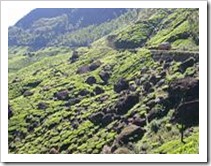This program will begin with intensive six-week course work at Furman, followed by a five-week residential experience at Madras Christian College (MCC) in Chennai, India. This will then be capped with a 4 week travel program from south to north India. The Fall 2011 courses offer an array of closely connected and interdisciplinary pursuits including, but not limited to, the natural environment, natural resources, population dynamics, urbanization, natural and anthropogenic hazards, gender, developmental psychology, poverty, health, culture, and sustainability.
 An ancient landslide dominates the landscape in this beautiful tea plantation along the Western Ghats (mountain) ranges of India. As one travels from Tamil Nadu (east) to Kerala (west), one can experience significant changes in the climate, vegetation, and culture. With abundant rainfall from monsoon, and relative inaccessibility, this region maintains it’s reputation as one of the top biodiversity hotspots in the world. We will learn about the origin of these mountains, agricultural practices (spice plantations!), natural hazards, health and educational issues, and sustainability challenges facing the people of this region.
An ancient landslide dominates the landscape in this beautiful tea plantation along the Western Ghats (mountain) ranges of India. As one travels from Tamil Nadu (east) to Kerala (west), one can experience significant changes in the climate, vegetation, and culture. With abundant rainfall from monsoon, and relative inaccessibility, this region maintains it’s reputation as one of the top biodiversity hotspots in the world. We will learn about the origin of these mountains, agricultural practices (spice plantations!), natural hazards, health and educational issues, and sustainability challenges facing the people of this region.![clip_image002[6]](https://blogs.furman.edu/ees/files/2010/09/clip_image0026_thumb2.jpg)
An oblique aerial view of the neighboring city and large river valley from top of the hill where an ancient temple sits. South India is famous for it’s rich culture, and temples with unique architecture and exquisite statues. Geologically, the rocks used to build these temples are some of the oldest rocks one can find in India.
Courses and Credits: This program offers four interconnected courses: Introduction to Geographic Information System (EES 201), India’s Natural Resources, Hazards, and Sustainability (EES 360), Poverty, Gender and Development in India (AST 282)Urbanization, Health and Environment in India (IDS 280) and will tentatively carry Empirical Study of the Natural World (NW), Humans and the Natural Environment (NE), Human Behavior (HB), and World Cultures (WC).
For More Information, Contact: Dr. Suresh Muthukrishnan (EES) and Dr. Veena Khandke (Asian Studies) or visit the following web sites
http://furman.edu/depts/asianstudies
http://furman.edu/depts/india/
